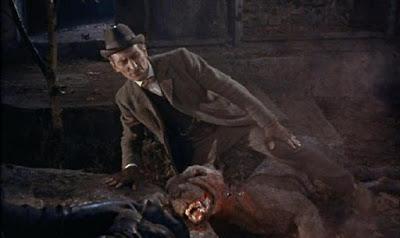Format: DVD from Perue Public Library through interlibrary loan on The New Portable.

There are some movies that I’m going to have a strange connection to. One of those is going to be any version of The Hound of the Baskervilles, the 1959 version no more than any other. The reason for this is my last dog. I have two Chihuahuas at the moment, but the dog I had before the current ones was a corgi mix named, well, Baskerville. I freely admit that I chose the name for her before we adopted her. I thought it was a great name for a dog. My mother objected, since Bassie was not a hound, but then again, Bass wasn’t her dog.
There are a lot of things I could say about the work of Sir Arthur Conan Doyle, some of which would be positive. It’s easy to have a character who is ultra-smart and can deduce anything when you know exactly what you want him to know. Doyle also believed firmly in hoaxes like the Cottingley Fairies, so I find it a little difficult to take him that seriously. That said, The Hound of the Baskervilles is a pretty cool story, and one of the only Sherlock Holmes stories I’ve actually read.
I’m not going to go into a great level of detail here. The story concerns a man named Henry Baskerville (Christopher Lee), who has just inherited the family estate. He is the last of his line, his late relative having died of some sort of heart ailment. There are those who think it was the family curse, though, and the Baskervilles do have a curse that follows them. A distant ancestor was a libertine who, according to the legend, was killed by a huge, satanic dog while he was out walking on the moors. This same legendary hound is alleged to have been a part of the death of Sir Henry’s late relative.
Naturally, since this is a Sherlock Holmes story, Holmes (Peter Cushing) and his faithful companion Dr. Watson (Andre Morell) are called in to investigate the happenings. Those happenings include additional deaths and scares as well as potential sightings of the great beast itself. And, while Doyle was evidently quite a huge fan of the supernatural, the ending of The Hound of the Baskervilles is a lot closer to the ending of an episode of Scooby-Doo.
There’s some great stuff here, and not all of it is the story (although some of it clearly is). One of the main reasons for success is the presence of Andre Morell, what has a completely new take on the character of Watson. Early Holmes films still had Sherlock Holmes as a deductive superstar. To that end, many of the early films, especially those with Nigel Bruce present Watson is a good-natured but ultimately bumbling accomplice of Holmes. Morell’s Watson is considerably different in that respect. While it is still Holmes’s intellect that will get us through to the end, Watson is there to do a great deal more than simple tell Holmes how brilliant he is.
In truth, I like a lot of the casting here. In fact, it is the other two stars that I think are worth the price of admission. Christopher Lee was great in just about everything he did, of course, and in this film, he’s in a very strange position. Rather than being the monster or the hero, Lee is essentially the equivalent of a damsel in distress, someone who is being stalked by fate, or monsters, or at least someone nefarious, making him in need of rescue constantly. I love that as a role for Lee, since it seems so outside of his norm, and he plays it well. It’s unusual to see Christopher Lee in even a mildly romantic role, and it’s also unusual to see him in this sort of peril.
But it’s Peter Cushing who controls the whole movie. There was apparently a series of these films planned, but when this one didn’t do well at the box office, the series was scrapped. That’s a shame, because Cushing makes a great Holmes. He was evidently a fan of the character and did some real research on it, including assisting in the costuming and the overall look of the character. Cushing, for instance, wanted to incorporate some visual cue of Holmes’s various chemical addictions.
If there’s a problem here, it’s in wanting more. The film is spare, running under 90 minutes, so it feels like it leaves out a good deal of the book. More than that, it also makes a number of changes. The good news is that these changes don’t really affect the story too much. While the fate or background of characters might change a little (or a lot), the overall story being told does not alter much. But if that’s the case, why make the changes at all?
I enjoyed this film and I enjoy a lot of films like it. I can forgive a great number of sins for an end result that is this entertaining and fun. Cushing seems made for the role so it feels unnecessarily clipped when the running time is this short. Other than that, though, this is just about perfect for what it wants to be.S
Why to watch The Hound of the Baskervilles (1959): Cushing as Holmes, Christopher Lee as a man in need of rescuing.
Why not to watch: It goes by much too quickly.
